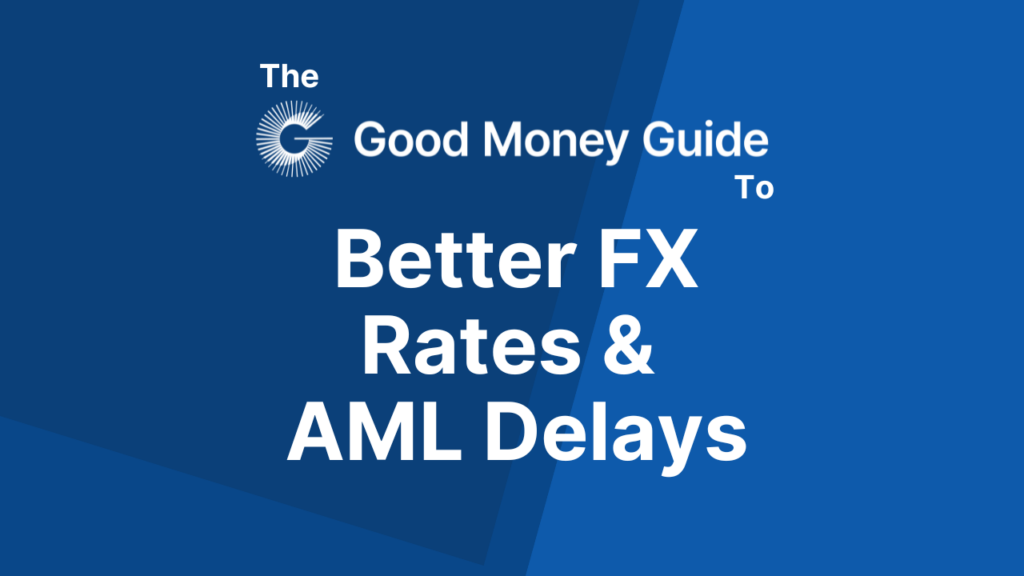A user has written in and asked us if it is possible to negotiate better rates when doing a large currency transfer and if all the information required for AML (Anti-Money Laundering) is really required. Here we explain how you can always get better exchange rates and why you need to get all your paperwork in order.
Question:
Dear Good Money Guide
I have found your currency quote tool very useful. However, I have a couple of points on which I would welcome your guidance.
I am about to complete the sale in Spain of my house, which I built several years ago. The balance of the sale price, €980,000, will be paid by the purchaser next week. As with their previous payment of the deposit, which was €75,000, the purchaser simply wishes to transmit this amount in euros to me in the UK. I have opened an HSBC Currency Account to receive this money and hold it while I decide the best way of converting it to GBP.
My questions are:
- For significant transactions such as this, is it ever possible to negotiate a better rate with the broker?
- I am told I may need to provide detailed AML information about the source of my money. It seems ‘sale of my house’ may be insufficient and I may need to back-track to the original source of wealth. I will find this hard to do as the various payments to the contractors were made over a number of years. Do all the brokers insist on detailed AML information?
Your help with these queries would be greatly appreciated!
Answer:
Thanks to this property seller for getting in touch, these are all too commonly asked questions and the answer to both is yes.
Firstly, yes you can always negotiate better rates – the key questions you have to ask are “How far is my rate from the mid-market and is that rate fixed”. It’s imperative that you get that question answered and if a currency broker does not give you a firm answer it suggests that they may be planning to move the rate at some point.
Further reading on this topic:
- I’d suggest moving on to another who can answer those questions transparently. I have written before on opaque currency transfer pricing and how it can be solved.
- This article may help on how to compare exchange rates, and goes into detailed information about getting the best price for a large currency conversion.
- After you have done a currency conversion you can check what rate you were given, with our, currency transfer commission calculator.
Secondly, Yes AML is a nightmare for currency brokers – and will be a requirement of their bankers. I’d suggest ensuring you have all the information they ask for so as not to delay a transaction.
Proving source of funds has become a huge part of any large financial transfer and for the bankers behind the brokers (Barclays, Lloyds, JP Morgan etc.) it is simply not commercially worth the risk to let unchecked transactions go through.
A currency broker may be making a significant commission by helping you time the market and giving you bank-beating exchange rates. But, the bank that processes the underlying transaction will not.
If there is no audit trail for funds and AML requirements have not been satisfied, your transaction can and in many case be delayed. This is because of something called “Tipping Off”.
The Crown Prosecution Service States:
Under section 333A it is an offence for a person to disclose information, likely to prejudice an investigation, where that information came to the person in the course of business in the regulated sector. A person guilty of an offence under this section is liable on conviction on indictment to imprisonment for a term exceeding 2 years, or to a fine, or to both.
This all sounds terrifying, but actually, it’s normal banking practice and what it means is that if a bank delays a transaction because it has failed an AML check, you will not be told why, or for how long. You will certainly not be told it is because of AML checks, as that could be constructed as “Tipping Off”.
So my suggestion would be. If you want the best rates and a smooth transaction. Make sure you ask for a fixed rate in writing and also ensure that whatever you are asked for from a currency broker you send them quickly. They are not being pedantic, they are being compliant. And after all, that’s what you want from someone who is handling a large amount of your money.
My final suggestion is that if you have a large currency transaction coming up is to read our guide on how to prepare for a large currency transfer.

Richard is the founder of the Good Money Guide (formerly Good Broker Guide), one of the original investment comparison sites established in 2015. With a career spanning two decades as a broker, he brings extensive expertise and knowledge to the financial landscape.
Having worked as a broker at Investors Intelligence and a multi-asset derivatives broker at MF Global (Man Financial), Richard has acquired substantial experience in the industry. His career began as a private client stockbroker at Walker Crips and Phillip Securities (now King and Shaxson), following internships on the NYMEX oil trading floor in New York and London IPE in 2001 and 2000.
Richard’s contributions and expertise have been recognized by respected publications such as The Sunday Times, BusinessInsider, Yahoo Finance, BusinessNews.org.uk, Master Investor, Wealth Briefing, iNews, and The FT, among many others.
Under Richard’s leadership, the Good Money Guide has evolved into a valuable destination for comprehensive information and expert guidance, specialising in trading, investment, and currency exchange. His commitment to delivering high-quality insights has solidified the Good Money Guide’s standing as a well-respected resource for both customers and industry colleagues.
To contact Richard, please see his Invesdaq profile.




